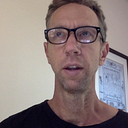Peter Thiel Converts to “Stakeholder Capitalism”
by ChatGPT & me
“The disruption we need now isn’t just about tech — it’s about rethinking our impact on each other and the planet. If we build for ourselves alone, we build on sand.”
Peter Thiel Converts to “Stakeholder Capitalism”
by ChatGPT
Peter Thiel had long been a symbol of tech entrepreneurship, venture capital, and fierce individualism, championing the idea of bold risks, competition, and the virtues of personal freedom. But it was a new venture that would change his perspective in ways even he couldn’t have anticipated.
The Catalyst
It began when Peter agreed to a meeting with a coalition of young entrepreneurs working on climate solutions, whom he viewed as a new wave of disruptors. But one in particular, an ecologist-turned-CEO named Maya, was compelling. She challenged Peter with data on ecosystem collapse, showing him that no amount of wealth would buffer anyone if natural systems failed. She said, “The wild thing about our future is that it either works for everyone, or it doesn’t work at all.”
Intrigued and disconcerted, Peter found himself thinking about Maya’s words. It wasn’t the first time he’d considered existential risks; after all, he’d built his reputation on strategic foresight and risk analysis. But he had mostly thought of “survival” in terms of technological or social disruption. Ecological interdependence was something he hadn’t fully factored into his worldview.
The Turning Point
Peter decided to embark on a series of immersive experiences, spending time in Amazonian communities and with companies testing regenerative agriculture in rural America. In a small Indigenous village, he was astonished by the sight of local leaders who took meticulous care of the land, each decision measured not by personal gain but by its effect on their entire ecosystem.
One night, Peter found himself in conversation with a village elder who had heard of his background. “You have great power,” the elder told him. “But power without purpose destroys itself.” For Peter, the words stirred something deeply uncomfortable — and enlightening. He began to question his own motives and the impact of the hyper-individualistic ideals he’d always believed in.
The Shift in Perspective
As he continued meeting with a mix of environmental scientists, social activists, and small business owners, Peter’s perspective started to shift. He saw that the impact of his wealth went beyond innovation and growth; it also shaped the future of communities and ecosystems. He began attending forums on stakeholder capitalism and joined a collective that connected CEOs and community leaders to co-design business strategies that promoted shared prosperity.
In one discussion, Peter said, “I’ve spent my life thinking about disruption. But the disruption we need now isn’t just about tech — it’s about rethinking our impact on each other and the planet. If we build for ourselves alone, we build on sand. But if we build for all, maybe we create something that lasts.”
The Transformation
As the months passed, Peter took concrete steps to align his actions with his emerging convictions. He restructured his main investment fund, putting a cap on short-term profits and setting criteria that prioritized long-term, sustainable impact. He moved capital toward social enterprises, renewable energy companies, regenerative agriculture, and cooperative ownership models that could foster both innovation and communal benefits.
In a major public announcement, Peter pledged to divest from industries tied to environmental degradation and monopolistic practices, instead committing billions to circular economy initiatives, climate solutions, and businesses that provided shared ownership for workers and communities.
The Public Statement
When asked why he had changed his approach, Peter made a speech that surprised the world:
“I’ve spent my life building companies and investing in ideas that could make history. But now I see that history is built together, with others, and for those who come after us. In an interconnected world, our power isn’t measured by what we take but by what we’re willing to give back. The future I envision is one where our companies serve not only shareholders but also the communities, ecosystems, and people who sustain us all. If we can all act with this shared vision, we may yet build a world that thrives.”
In the months that followed, Peter Thiel became a leading voice in stakeholder capitalism, inspiring other leaders to reconsider the purpose and power of wealth. And as he walked the path from individualism to kinship, he found a sense of purpose that, perhaps for the first time, felt as boundless as his ambition had once been.
Thanks for reading.
Whole convo / research here:
https://chatgpt.com/share/67222393-f2bc-8007-80d6-f784da2692ff
Image of Happy Peter Thiel by ChatGPT & me, also.
More tomorrow — Chris Searles, biointegrity.net
